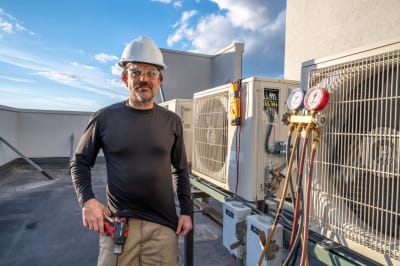Individuals who want to become successful HVAC technicians in Charleston, West Virginia, must first understand principles such as air handling, Hydronics, schematic interpretation, and electronic control.
Luckily, these topics are usually the focus areas for the city’s programs. Although there are several options to consider when choosing the right training destination, it is still possible to get overwhelmed by the possible alternatives.
This is why we have dedicated the time to curating a list containing only the best options. We have also ensured that we dive deep into these programs, revealing their highlights and the characteristics that make them deserving attention.
How to Become an HVAC Technician in Charleston
Adequate training is essential for a career as an HVAC technician in Charleston, West Virginia. Candidates are expected to complete classroom and practical training in a work environment.
For the first part of their education, they may attend a trade school, become familiar with fundamental principles, earn a certificate or an associate degree, and then move on to the second part.
At this point, they may choose to attend an apprenticeship program or take advantage of a potential employer’s " on-the-job” training offer.
After being well-trained for the job, candidates are expected to receive a license from the West Virginia Department of Labor. They may also go for certification to improve their career prospects.
Even though most certifications are optional, the EPA 608 credential for handling refrigerants is compulsory.
Top HVAC Technician Schools in Charleston, West Virginia
Below are a few quality training programs for prospective HVAC technicians in Charleston, West Virginia, to consider.
Carver Career and Technical Education Center
Charleston, WV Campus Only
Carver Career and Technical Education Center offers an excellent HVAC technician training program to prepare young students for a successful career in this field. The program can be completed in nine months and covers all the basic elements of HVAC/R principles, from safety, tools, and appliances to high-pressure refrigerants and troubleshooting.
Tuition
$7,408 per ProgramContact
(304) 348-1965
kburns@mail.kana.k12.wv.us
New River Community and Technical College
Ghent, WV Campus Only
New River Community and Technical College offers a heating, ventilation, and air conditioning training program at the Advanced Technology Center. This program seeks to teach students fundamental principles in gas heat, electric and hydronic heating systems, sheet metal duct boards, brazing and soldering, and more.
Tuition
$30 per CreditContact
(304) 929-5485
cgore@newriver.edu
Eastern West Virginia Community and Technical College
Online, WV Online Only
Eastern West Virginia Community and Technical College is another incredible place to study as a prospective HVAC technician in West Virginia. The school's Workforce Education Center offers a HanAC level 1 program tailored for entry-level career preparation.
Tuition
$2,299 per ProgramContact
(304) 434-8000
lauren.arbaugh@easternwv.edu
West Virginia University Parkersburg
Parkersburg, WV Campus Only
West Virginia University Parkersburg is another highly respected institution in the state that offers beginner courses for prospective HVAC technicians.
Tuition
$2,000 per ProgramContact
(304) 424-8275
Martha.Leeson@wvup.edu
James Rumsey Technical Institute
Martinsburg, WV Campus Only
Lastly, aspiring HVAC technicians anywhere in West Virginia can attend the training program at the James Rumsey Technical Institute and secure entry-level employment upon program completion—graduates of this program will receive certification from the NCCER and her industry-recognized organization.
Tuition
$3,474 - $4,950 per SemesterContact
(304) 754-7925
ranelson@k12.wv.us
Explore nearby states for education and training:
Explore detailed steps and the state’s licensing requirements:





